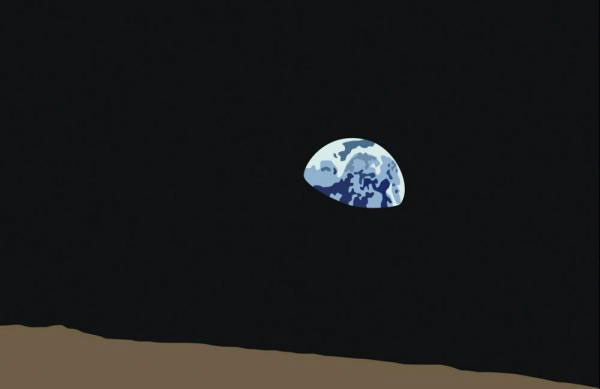- Open today, 10 am to 5 pm.
- Parking & Directions
- Free Admission
Edward Burtynsky: Water
NORFOLK, Va. (Feb. 1, 2016)—Explore humanity’s complicated relationship with our most precious natural resource through the lens of internationally renowned photographer Edward Burtynsky. The Chrysler Museum of Art’s winter/spring keynote exhibition, Edward Burtynsky: Water, includes more than 60 large-scale color photographs that form a global portrait of the intricate intersections of humanity and our most precious natural resource. The exhibition, organized by the New Orleans Museum of Art, will run through May 15. Admission is free.
In his work, Burtynsky takes full advantage of recent technological changes in photography, which allow him to create massive images, several feet tall and wide. His photos engulf the viewer with stunning vistas in incredible detail. These images—part photograph, part abstraction, and part anthropological treatise—transform the viewers’ experience and challenge their senses to comprehend what is shown in the frame.
“Edward Burtynsky harnesses the advances in digital photography to create high-tech images reminiscent of the modern masters that he so admires, artists such as Jean Dubuffet, David Shapiro, Casper David Friedrich, and Richard Diebenkorn,” said Chrysler Museum Director Erik Neil. “Just as those painters had an affinity for landscapes, Burtynsky explores abstract art with aerial photographs that minimize detail and context to create massive images that defy description.”
Other images concisely tell a story or show a clear cause-and-effect relationship.
“The beautiful thing about Burtynsky is that you can enjoy his work however you want—as environmental messages, as narrative tales, or simply as arresting and overpowering works of art,” Neil said.
Five years in the making, Water is Burtynsky’s most detailed and expansive project to date. The show includes images of the 2010 Gulf of Mexico oil spill, step-wells in India, dam construction in China, Asian aquaculture, and North American and European farming and pivot irrigation systems. It also features some of the first pure landscapes that Burtynsky has made since the early 1980s. These archaic, almost primordial-looking images of British Columbia place the structures of water control in a historical context, tracing the story of water from the ancient to the modern and back again.
While the story of water is certainly an ecological one, the photographer is more interested in presenting the facts on the ground than in declaring society’s motives as being good or bad. In focusing on all the facets of people’s relationship with water, including ritual and leisure uses, he offers evidence without an argument. This is a signature of all his series of chromogenic prints, each of which builds upon his previous work and photographic explorations.
“Burtynsky’s work functions as an open-ended question about humanity’s past, present and future,” said Russell Lord, Freeman Family Curator of Photographs at the New Orleans Museum of Art and organizer of the traveling exhibition. “The big question is: do these pictures represent the achievement of humanity or one of its greatest faults, or both? Each visitor might find a different answer in this exhibition depending upon what they bring to it.”
Edward Burtynsky: Water is on view Feb. 12–May 15, 2016 at the Chrysler Museum of Art. Admission is free.
ABOUT EDWARD BURTYNSKY
Edward Burtynsky was born in 1955 in St. Catharines, Ontario, and is one of Canada’s most respected photographers. He has long been recognized for his ability to combine vast and serious subject matter with a rigorous, formal approach to picture-making. The results are images that are part abstraction, part architecture, and part raw data. His photographs are included in the collections of more than 60 major museums around the world, including the National Gallery of Canada, the Museum of Modern Art, the Guggenheim Museum in New York, the Reina Sofia Museum in Madrid, and the Los Angeles County Museum of Art in California.
He received his Bachelor of Applied Arts in photography/media studies from Ryerson University in 1982. In 1985, he founded Toronto Image Works, a photography lab and training center for Toronto’s art community. Burtynsky’s photographic development was influenced by the sites and images of the General Motors plant in his hometown and eventually led to his exploration of the human systems we have imposed on our natural landscape. He has been awarded the TED prize, The Outreach award at the Rencontres d’Arles, the Roloff Beny book award, and the Rogers Best Canadian Film Award. For more information, see edwardburtynsky.com.
ABOUT THE CHRYSLER MUSEUM OF ART
The Chrysler Museum of Art is one of America’s most distinguished mid-sized art museums, with a nationally recognized collection of more than 30,000 objects, including one of the great glass collections in America. The core of the Chrysler’s collection was given to the Museum by Walter P. Chrysler, Jr., an avid art collector who donated thousands of objects from his private collection to the Museum. In the years since Chrysler’s death in 1988, the Museum has dramatically enhanced its collection and extended its ties with the Norfolk community. The Museum, expanded in 2014 to add additional gallery spaces and amenities for visitors, now has growing collections in many areas. The Chrysler also mounts an ambitious schedule of visiting exhibitions and educational programs and events each season.
In 2011, the Chrysler opened a full-service glass Studio adjacent to the Museum. This state-of-the-art facility features a 560-pound capacity glass furnace, a full hot shop, a flameworking studio, nine annealing ovens, and a coldworking shop. In addition, the Chrysler Museum of Art administers two historic houses in downtown Norfolk: the Moses Myers House and the Willoughby-Baylor House.
The Chrysler Museum of Art, One Memorial Place, Norfolk, and its Perry Glass Studio, at 745 Duke St., are open to the public Tuesday through Sunday. The Historic Houses on East Freemason Street are open weekends. General admission is free at all venues.
-30-

